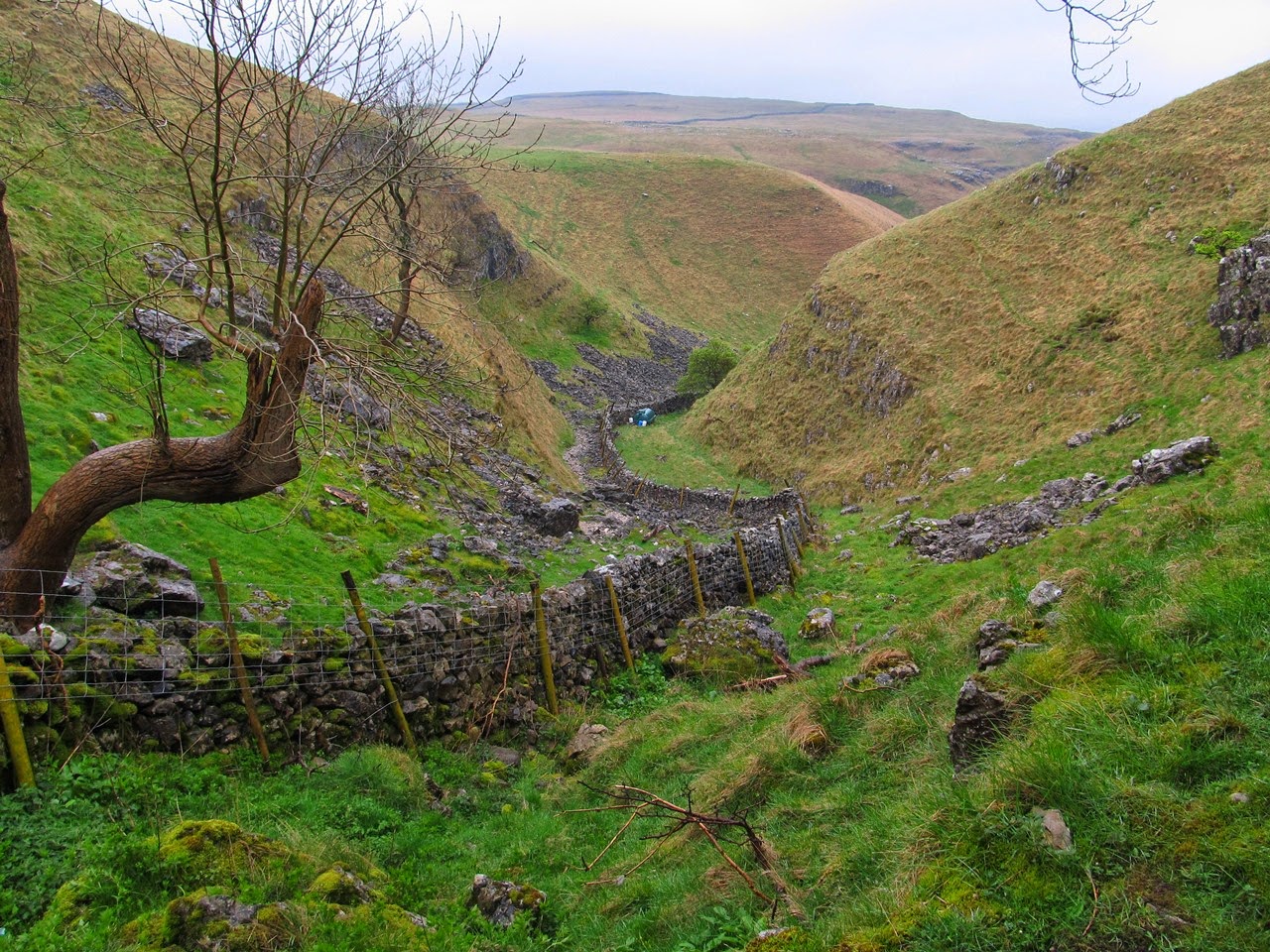This walk started in the rain, which is always a depressing thing to do because you never believe that it’s ever going to get better and you feel that you’re doomed to walk in the rain all day even though that is actually rarely the case and it wasn’t now, partly because after lunch I caught a bus to go home. For the last walk of my holiday I decided that, mainly due to the weather, but also due to buses not running at convenient times down Wharfdale, I would walk to Grassington. My original hope for this day had been to do a walk further down Wharfdale near Bolton Abbey, but a lack of buses through the valley forced me into doing this smaller and less significant walk instead. My plan was to follow the Dales Way, which I’d followed into Kettlewell the day before, so I set off in the pouring rain along the road until just after passing Scargill House I turned left to walk up Highgate Leys Lane. This track leads all the way onto the high moor, but the Dales Way soon leaves the lane to make its way across a gently contoured hillside past many ancient enclosures to eventually reach the limestone outcrops of Swineber Scar.
The visibility was very poor and the misty scenery was so unappealing I just kept my head down and kept going past the limestone scars, stopping just once, at the top of an outcrop of limestone known as Conistone Pie, but as fascinating as this large rock was, the surroundings were so grey and misty that I didn’t stay very long before resuming my walk along the Dales Way. It wasn’t long until I reached Scot Gate Lane and the top of Conistone Dib, which is an interesting narrow valley full of rocks and with steep grassy slopes, but I was at the top of it. Walkers on the Dales Way bypass this peculiar feature with barely a glance but I wanted to explore it and that entailed carefully climbing down the wet rocks into the valley and then walking all the way down it. There is reportedly a spectacular gorge at the bottom of the valley, but unfortunately I didn’t descend that far, which is a pity and with hindsight I wish I had descended all the way into Conistone.
Instead I climbed back out of the valley and onto the Dales Way to resume my walk south towards Grassington as the rain eventually eased. I passed more limestone features, but I wasn’t finding the scars particularly interesting while an old lime kiln near the path was more successful in drawing my attention. On this holiday I have to admit that I was not impressed with the subtle limestone features of the terrain as it seems I prefer the bolder, more dramatic features of volcanic regions like the Lake District. The botanic features of the landscape, meaning the wild flowers, were by far the biggest draw of the week, and the banks of primroses that I saw in many places were the definite highlight while the limestone scars failed to excite me (however I was impressed with the enormous limestone pavement of Moughton, near Ingleborough, which was a definite highlight despite being there when it was raining).
In the narrow strip of land between the road and the river I found a much more abundant display of wild flowers including banks of bluebells newly in flower. Primroses and wood anemones were also on display that went some way to reducing my disappointment in Grass Wood. I think my problem is that I’ve seen better, but timing is so critical with woodland flowers that I could come back a week later and find a completely different display. A delightful walk beside the River Wharfe took me through the wood to a set of rapids with the peculiar name of Ghaistrill’s Strid that were fun to explore, while clambering over the rocks beside the river to get a closer look. Continuing alongside the river I eventually rejoined the Dales Way as I walked past Grassington until I reached Linton Falls. After a good look at this waterfall that is marred by old factory buildings beside the river I made my way along a path up into the village of Grassington to the National Park Centre.
There I enquired as to the next bus to Skipton only to learn that I had just missed one and the next was an hour and a half away. My disappointment was further increased by the weather that had promptly cleared now that I had stopped walking to leave glorious sunshine for the rest of the day, however Grassington is not a bad place to spend an hour and half. This walk hadn’t been too bad, especially after the rain stopped, as I did enjoy the end of the walk wandering around Grass Wood and beside the River Wharfe. It might have only been lunchtime but I think I was ready to go home. As for the whole holiday, did I see the gems that I’d been hoping for? I saw a few gems, and not a few waterfalls, but I didn’t appreciate the difficulty in finding those gems. Ultimately the Yorkshire Dales cannot compete with the Lake District or similar places. Pot holes and limestone outcrops might not hold much interest for me, but there are things in the Yorkshire Dales that are really appealing so I'm sure I will be back, even if I have to wait another five years.


No comments:
Post a Comment